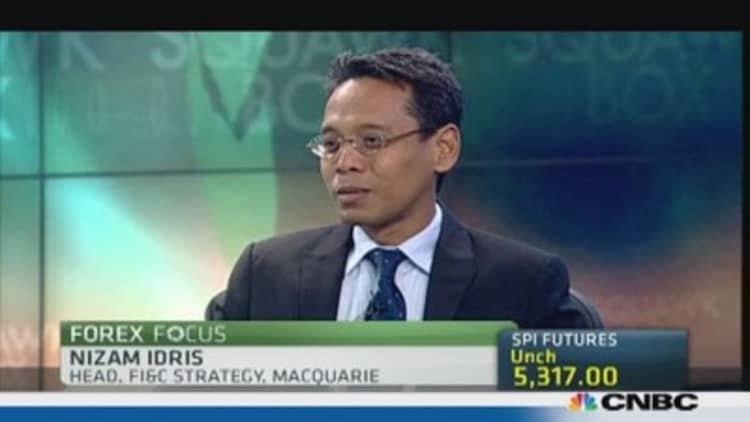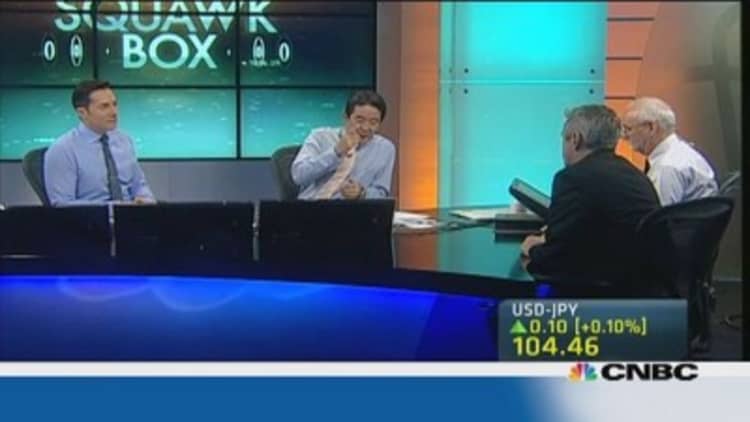As the yen hit a five-year low on Thursday, analyst calls are becoming increasingly bearish, with some saying the currency could fall as low as 125 per dollar by the end of next year.
The yen hit 104.84 per dollar in early Asian trade on Thursday, the second time its hit the five year low this month, after the Bank of Japan (BOJ) said it would continue its unprecedented easing program, while the U.S. Federal Reserve will begin to trim its stimulus program in January.
Analysts now expect the weakening trend to pick up pace as we move into 2014.
(Read more: Japan stocks rise to fresh 6-year highs)
"If we look at the period pre-crisis in Japan we had dollar yen in a 103 to 125 range. We're finally breaking back into the pre-crisis range for dollar-yen," said Timothy Riddell, head of global markets research for Asia at ANZ.
"Dollar-yen is on track to end 2013 with a bang," added Mitul Kotecha, head of global currency research at Credit Agricole.
(Read more: Abenomics scorecard: 'A' for early initiative, 'C' for follow-through)
"Further evidence that 'Abenomics' is working in the form of rising inflation points to a further move higher in dollar-yen over coming months; we continue to anticipate a move in the dollar-yen to 115 by end 2014," he added.

The weaker yen has been one the biggest currency stories of 2013. The yen is down 20 percent year-to-date against the dollar amid the Japanese government's efforts to radically reform its economy in a bid to achieve 2 percent inflation in roughly two years' time.
However, while the currency saw rapid losses in the first five months of the year, the trend appeared to lose momentum halfway through when the advent of 'taper talk' prompted the yen to strengthen back to the 94 per dollar level in June, while at the same doubts about the success of Abenomics also helped derail the trend.
(Read more: The verdict on Abenomics, one year on)
But in recent months, the yen's downward trend has regained some momentum as uncertainty over the Fed's taper talk subsided and positive economic data out of Japan increased confidence that Prime Minister Shinzo Abe's plan was working. The dollar-yen has gained near 7 percent since the start of October.
Credit Agricole's Kotecha added that the removal of some of the negative headwinds impacting Japan next year would also reinforce downward pressure on the yen.
"A disappointment for yen bears over 2013 has been the lack of portfolio capital outflows by Japanese investors. Outflows were expected to provide a negative influence on the yen but so far any such outflow has been limited," he said.

"Going forward it is our expectation that relatively higher yields and in particular improving risk appetite will fuel bigger capital outflows and reinforce the downward pressure on the yen," he added.
(Read more: HSBC strategist: Am I the last person in the world underweight Japan?)
Meanwhile, Nizim Idris, head of strategy, fixed income and currencies, at Macquarie bank also told CNBC on Thursday he also saw the yen resuming its weakening trend over next year.
However, he added that the Bank of Japan many need to increase its easing program to keep it on a downward course. He forecasts dollar-yen at 110 by the end of 2014.
"Right now I am still not confident, although the direction of travel in the dollar-yen is precisely where the BOJ wants it to go, so therefore they are happy to sit back and say we are hitting that 2 percent over two years, once it [dollar-yen] moves in the wrong direction I think these guys will have to do more," he added.
(Watch now: Abenomics: A year in review)
Japan is due to report consumer price index data for November on Friday, December 27th. According to a Reuters poll of 28 economists, inflation is seen reaching a new five-year high of 1.1 percent on year in November. Inflation stood at a five-year high of 0.9 percent in October.
— By CNBC's Katie Holliday: Follow her on Twitter @hollidaykatie


